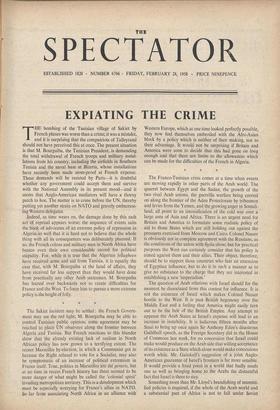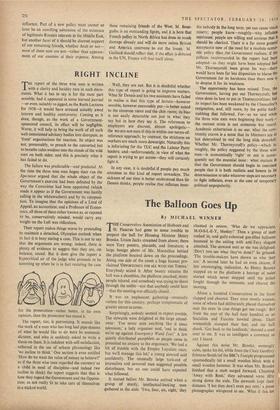EXPIATING THE CRIME
THE bombing of the Tunisian village of Sakiet .by French planes was worse than a crime; it was a mistake, and it is surprising that the compatriots of Talleyrand should not have perceived this at once. The present situation is that M. Bourguiba, the Tunisian President, is demanding the total withdrawal of French troops and military instal- lations from his country, including the airfields in Southern Tunisia and the naval base at Bizerta, whose installations have recently been made atom-proof at French expense. These demands will be resisted by Paris—it is doubtful whether any government could accept them and survive with the National Assembly in its present mood—and it seems that Anglo-American mediators will have a thorny patch to hoe. The matter is to come before the UN, thereby putting yet another strain on NATO and gravely embarrass- ing Western delegates.
.Indeed, as time wears on, the damage done by this rash act of reprisal appears worse; the sequence of events suits the book of advocates of an extreme policy of repression in Algeria, so well that it is hard not to believe that the whole thing with all its consequences was deliberately planned. If so, the French colons and military men in North Africa have beaten even their own considerable record for political stupidity. For, while it is true that the Algerian fellagheen have received arms. and aid from Tunisia, it is equally the case that, with M. Bourguiba at the head of affairs, they have received far less support than they would have done from practically any other Arab statesman. M. Bourguiba has leaned over backwards not to create difficulties for France and the West. To force him to pursue a more extreme policy is the height of folly.
The Sakiet incident may be settled : the French Govern- ment may see the red light; M. Bourguiba may be able to control Tunisian public opinion; some agreement may be reached to place UN observers along the frontier between Algeria and Tunisia. But French reactions to this blunder show that the already existing lack of realism in North African policy has now grown to a terrifying extent. The recent Marseilles by-election, in which a Communist got in because the Right refused to vote for a Socialist, may also be symptomatic of an increase of political extremism in France itself. True, politics in Marseilles are sid generis, but at no time in recent. French history has there seemed to be more danger of what might be called the 'colonial spirit' invading metropolitan territory, This is a development which must be especially worrying for France's allies in NATO. So far from associating North Africa in an alliance with Western Europe, which at one time looked perfectly possible, they now find themselves embroiled with the Afro-Asian block by a policy which is neither of their making, nor to their advantage. It would not be surprising if Britain and America were soon to decide that this had gone on long enough and that there are limits to the allowances which can be made for the difficulties of the French in Algeria.
The Franco-Tunisian crisis comes at a time when events are moving rapidly in other parts of the Arab world. The quarrel between Egypt and the Sudan, the growth of the two rival Arab unions, the guerrilla warfare being carried on along the frontier of the Aden Protectorate by tribesmen and levies from the Yemen, and the growing anger in Somali- land, all point to an intensification of the cold war over a large area of Asia and Africa. There is an urgent need for Britain and America to formulate some realistic policy of aid to those States which are still holding out against the pressures exercised from Moscow and Cairo. Colonel Nasser, is obviously not in complete agreement with the Russians, as the conditions of the union with Syria show; but for practical purposes the West can certainly consider that his policy is aimed against them and their allies. Their object, therefore, should be to support those countries who fear an extension of Egyptian influence, but to do it in such a manner as to give no substance to the charge that they are interested in establishing, a new 'imperialism.'
The question of Arab relations with Israel should for the moment be dissociated from this contest for influence. It is not the existence of Israel which makes- Colonel Nasser hostile to the West. It is past Britisk hegemony over the Middle East and a feeling that America might easily turn out to be the heir of the British Empire. Any attempt to appease the Arab States 'at Israel's expense will lead to an increase in instability. It is ludicrous fifteen months after Sinai to bring up once again Sir Anthony Eden's disastrous Guildhall speech, as .the Foreign Secretary did in the House of Commons last week, for no concession that Israel could make would produce on the Arab side that willing acceptance of its existence as a State which alone would make concessions worth while. Mr. Gaitskell's suggestion of a joint Anglo- American guarantee of Israel's frontiers is far more sensible. It would provide a fixed point in a world that badly needs one as well as bringing home .to the Arabs the distasteful fact that Israel is there to stay.
Something more than Mr. Lloyd's brandishing of mummi- fied policies is required, if. .the whole of the Arab world and a substantial part of Africa is not to fall under Soviet
influence. Part of a new policy must sooner or later be an unwilling admission of the existence of legitimate Russian interests in the Middle East, but another facet of it should be discreet support of our remaining friends, whether Arab or not— most of them now are not—rather than appease- ment of our enemies at their expense. Among these remaining friends of the West, M. Bow- guiba is an outstanding figure, and it is here that French policy in North Africa has done so much damage already and will do more unless Britain and America intervene to cut the losses. M. Gaillard should reflect that, if the affair is debated in the UN, France will find itself alone.



































 Previous page
Previous page